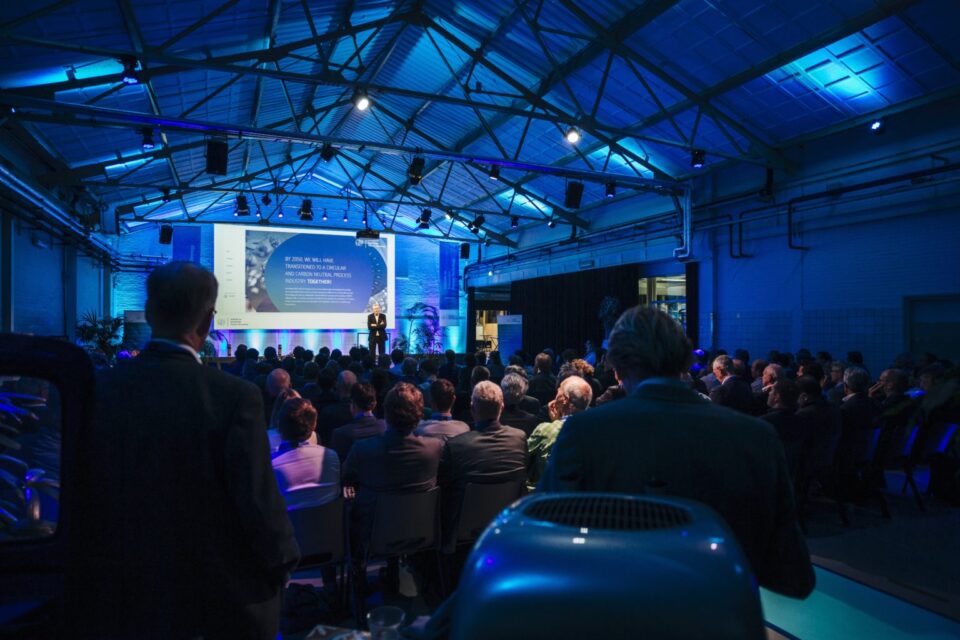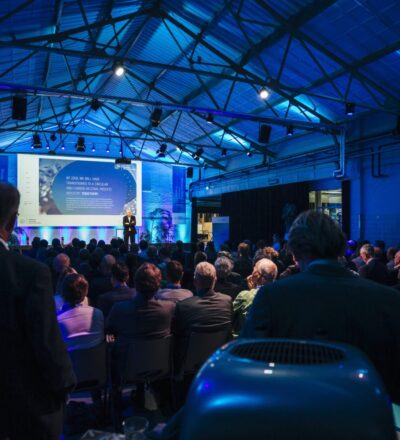Circularity is a booming term in both industry as well as the public debate. How can we implement the goal of a circular industry in different sectors, such as food, paper, steel, and chemistry? This was this year’s theme of ISPT Conference 2019 in Amersfoort.
The Institute for Sustainable Process Technology (ISPT) had the pleasure of welcoming over 150 guests at the ISPT Conference 2019, the place to be for stakeholders from industry, government, research and SMEs for inspiration and networking. The event furthermore offered the opportunity of sharing the results of the latest sustainable projects in process technology.
Circularity in process industry
The conference started with a plenary opening by ISPT director Tjeerd Jongsma, followed by Andreas ten Cate (ISPT) who focused on the role of circularity in the Steel2Chemicals project.
The plenary opening was finalized by Annemieke Nijhof, who elaborated further on the matter from the perspective of Springtij, a three day forum to further stimulate the sustainability transition in the Netherlands.

The chemical industry as an enabler for a circular economy
After the plenary opening, the guests at the ISPT Conference 2019 had the opportunity to attend various parallel sessions on how to implement circularity in different sectors of the process industry. ISPT invited four inspiring speakers.
Marco Waas (Director RD&I and Technology at Nouryon) addressed the role of chemical industry as an enabler for a circular economy. He stressed that innovation occurs where waste and chemistry meet. An important issue is funding: Marco discussed the options of crowdfunding, venture capitalists and government support. Conclusion: don’t look for standard funding, but think outside of the box.
How to incentivize circularity?
The session of Kees Biesheuvel (Technology Innovation Manager at Dow Chemicals Benelux) was on the non-technical material cycle. Kees posted the question how to incentivize circularity. This appears to be an organizational matter concerning issues such as conflict of interests, quality versus quantity, slow and limited movement, disruption, branding and change management.
We need a new, innovative agriculture that is not stealing from the earth
Wouter de Heij (owner of Food4Innovations and CEO of TOP b.v.) gave insights into circularity within the food industry. Next to problems with the nitrogen, carbon and phosphate cycle, he argued that the balance is gone for the way we address food production and intake. Wouter calls for a new, innovative agriculture that is not stealing from the earth like the current one. Furthermore he stressed that we need to follow healthy food patterns. The key is that innovation comes from new combinations and the guts to become a ‘Talpa’: invest to innovate instead of focusing on money.
Serious game about the reuse of brine and minerals
The fourth parallel sessions was different than the other three. Kees Roest (Coordinator TKI Watertechnology at KWR) organized a serious game where he offered an experience with circularity aimed at the reuse of brine and minerals. By doing so, he offered valuable insight for the application of serious games as a strategy to raise awareness in the implementation of circularity.
The official part of the ISPT conference ended with an open stage for innovative projects, hosted in style by ISPT’s Nathan Bowden. Six entrepeneurs pitched their project in five minutes, among who Frank Tielens from HeatMatrix, Fabian Compagner from ToPerform and Ron Vaz Dias and Angela Hulst from iTanks.
The ISPT Conference 2019 brought the guests and ISPT’s team lots of inspiration, knowledge ánd fun. We are looking forward to the next one!
